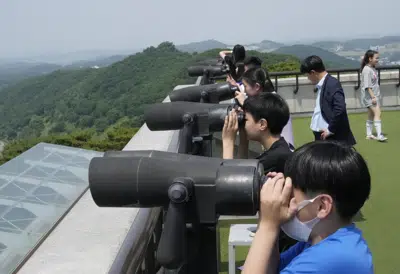SEOUL, South Korea (AP) – North Korea’s first attempt to send a spy satellite into space failed , undermining ruler Kim Jong-un’s efforts to bolster military power amid heightened tensions with the United States and South Korea.
North Korea admitted its failure with unusual speed, but vowed to carry out a second launch after learning what had gone wrong. This suggests Kim remains determined to expand his arsenal and put more pressure on the United States and South Korea as diplomacy stalls.
South Korea and Japan briefly urged residents to evacuate after the launch.
South Korea’s military said it had recovered an object believed to be part of a downed North Korean missile in waters 200 kilometers (125 miles) west of southwest Tacheong Island. The Pentagon later released a photo of the white metal cylinder, which it said was suspected to be part of a missile.
North Korea’s satellite launch violates a UN Security Council resolution banning any launch based on ballistic technology. Observers say North Korea’s past satellite launches have helped improve its long-range missile technology. North Korea’s recent long-range missile tests show it has the potential to reach all of the continental United States, but outside experts believe North Korea has no plans to develop a viable nuclear missile. He says there is still work to be done.
U.S. National Security Council spokesman Adam Hodge said in a statement that it strongly condemned the North Korean launch because North Korea’s use of banned ballistic missile technology has increased tensions both within and outside the region and threatened security. It’s a risk of destabilization, he said. The United Nations has imposed economic sanctions over North Korea’s past satellite and missile launches.
He said the military in Seoul is working with the United States to strengthen military preparedness, and said Japan is ready to respond to any emergency. The United States said it would take all necessary measures to ensure the security of the United States homeland and the defense of South Korea and Japan.
South Korea’s capital Seoul issued warnings via loudspeakers and text messages on cellphones urging residents to prepare to evacuate after the launch was spotted, while Japan warned Okinawa Prefecture in southwestern Japan where the rocket trajectory was suspected.
Japan’s warning warned, “Evacuate indoors or underground.” Japanese Defense Minister Yasukazu Hamada said Japan plans to continue deploying missile defense systems to its southern islands and southwestern waters by June 11, the end date of the launch period announced by North Korea.
KCNA has not released any details about the rocket or satellite other than its name. Experts have previously said North Korea would likely field a liquid-propellant missile, like many of the long-range and missiles it has tested.
According to KCNA, a more full-scale investigation is planned, but the North American Aerospace Development Agency blamed the failure on “low reliability and stability of the launch vehicle’s new engine system” and “fuel instability.”
A senior North Korean official, Ri Pyeong-Chol, said on Tuesday that North Korea needs a space-based reconnaissance system to counter rising security threats from South Korea and the United States. But the reconnaissance satellite, previously featured in state media, apparently wasn’t sophisticated enough to produce high-definition images. Some outside experts said it could detect military movements and large targets such as warships and fighter jets.
Recent commercial satellite imagery from North Korea’s West Sea Launch Center shows active construction, suggesting North Korea plans to launch multiple satellites. In a statement on Tuesday, Mr. Ri also said North Korea would test “a range of intelligence tools” to monitor real-time movements of the United States and its allies.
North Korea could use three to five spy satellites to build a space surveillance system that could monitor the Korean peninsula in near-real time, said Lee Chung-geun, an honorary fellow at the Korea Institute of Science and Technology Policy.
The satellite is one of several high-tech weapon systems Kim has publicly promised to launch. His wish list also includes multiple warhead missiles, nuclear submarines, solid-fuel intercontinental ballistic missiles and hypersonic missiles. During a visit to the space agency in mid-May, Kim emphasized the strategic importance of spy satellites in conflicts between North Korea and the United States and South Korea.
Easley said Kim likely stepped up pressure on scientists and engineers to launch spy satellites after rival South Korea successfully launched its first commercial satellite earlier this month on a home-made Nuri rocket.
